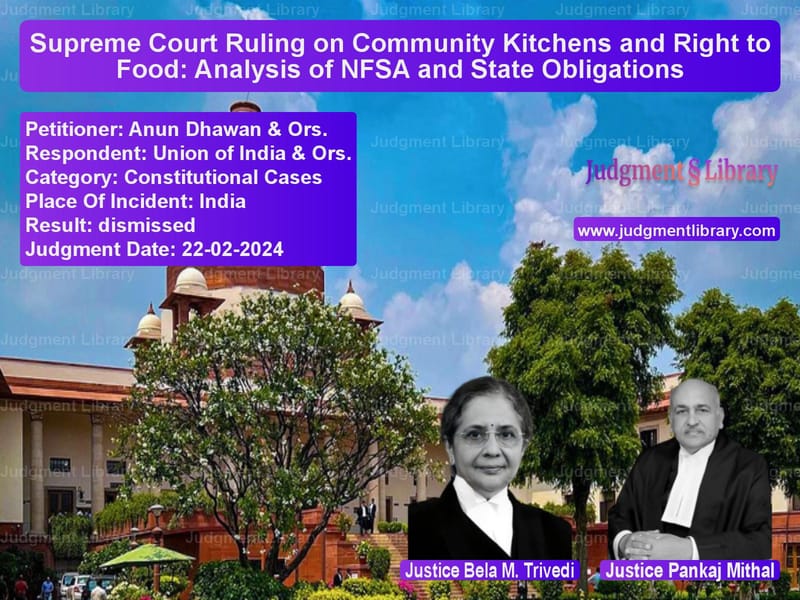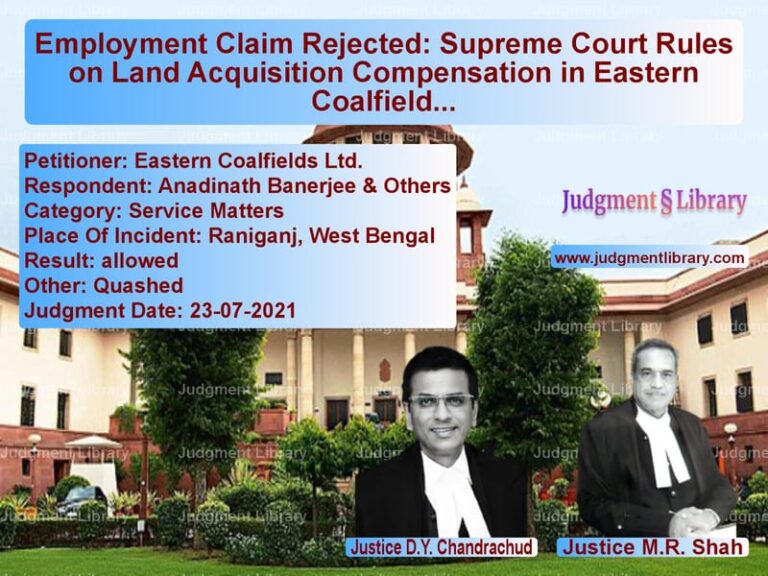Supreme Court Ruling on Community Kitchens and Right to Food: Analysis of NFSA and State Obligations
The Supreme Court of India, in the case of Anun Dhawan & Ors. v. Union of India & Ors., examined the legal and constitutional aspects of the right to food and the demand for implementing community kitchens across states. The petitioners, claiming to be social activists, sought various directions to address hunger, malnutrition, and starvation deaths in the country. They urged the Court to mandate the Union and State Governments to formulate a comprehensive scheme for community kitchens. However, the Court ultimately ruled that existing legal frameworks, including the National Food Security Act, 2013 (NFSA), already provide an adequate structure to ensure food security and that directing the government to implement a particular policy falls beyond the Court’s jurisdiction.
Background of the Case
The petitioners, through a writ petition under Article 32 of the Constitution, sought:
- Directions for all States and Union Territories to formulate a scheme for community kitchens.
- Implementation of a national food grid beyond the existing Public Distribution System (PDS).
- Involvement of the National Legal Services Authority to frame policies for ensuring food security.
The petitioners argued that despite the presence of government welfare schemes, hunger and malnutrition persisted, affecting the right to life and dignity under Article 21 of the Constitution. They emphasized that ensuring food security was a constitutional duty of the State under Article 47, which mandates raising nutritional levels and improving public health.
Government’s Response
The Union of India, along with several State Governments, submitted affidavits detailing existing welfare schemes aimed at food security, including:
- Pradhan Mantri Garib Kalyan Anna Yojana: Free grain distribution to poor households.
- One Nation One Ration Card: A scheme allowing migrants to access subsidized food from any part of the country.
- Mid-Day Meal Scheme: Providing free meals to school children.
- Annapurna Scheme: Food support for senior citizens.
- Pradhan Mantri Poshan Shakti Nirman Scheme: Focused on child nutrition.
The government argued that these schemes sufficiently addressed hunger and malnutrition concerns, and no starvation deaths had been officially reported. Furthermore, the government contended that the Supreme Court’s role should be limited to assessing the legality of policies rather than directing specific policy implementations.
Petitioners’ Arguments
The petitioners contended that:
- The government schemes were not fully effective in eliminating hunger and malnutrition.
- The right to food should be explicitly recognized as a fundamental right under Article 21.
- The government’s reliance on existing schemes overlooked the need for an additional safety net in the form of community kitchens.
- Even if hunger does not always result in death, the State is constitutionally obligated to ensure a minimum standard of living for all.
Supreme Court’s Analysis
The Court recognized that while the right to food is not explicitly mentioned in the Constitution, it is an integral part of the right to life and dignity under Article 21. The Court also acknowledged the importance of Article 47, which imposes a duty on the State to improve nutritional standards and public health.
The Supreme Court extensively analyzed the National Food Security Act, 2013 (NFSA), which provides a legal framework to ensure food security. The Court observed:
- NFSA marked a shift from a welfare-based to a rights-based approach to food security.
- The Act mandates subsidized food grain distribution through the Public Distribution System (PDS).
- It includes provisions for special groups such as pregnant women, lactating mothers, and children.
- It incorporates a grievance redressal mechanism to address food distribution issues.
The Court emphasized that the NFSA already provides an extensive mechanism to address hunger and that judicial interference in policy formulation should be limited.
Key Judicial Observations
The Court ruled that:
- The judiciary’s role in policy matters is limited. Courts cannot dictate policy choices to the government.
- The existing framework under NFSA, combined with various government schemes, sufficiently addresses food security concerns.
- The decision to implement community kitchens or similar schemes should be left to the executive.
- The Court cannot assess the comparative effectiveness of different policies and impose one over another.
Important Excerpts from the Judgment
The Court stated:
“The Constitution of India does not explicitly provide for the right to food, but the fundamental right to life under Article 21 includes the right to live with human dignity and access to basic necessities, including food.”
On policy matters, the Court observed:
“The scope of judicial review in examining policy matters is very limited. Courts do not and cannot examine the correctness, suitability, or appropriateness of a policy, nor are they advisors to the executive on policy formulation.”
Regarding the NFSA, the Court noted:
“With the enactment of the National Food Security Act, 2013, there has been a paradigm shift from a welfare approach to a rights-based approach. The Act ensures food security through various government schemes.”
Final Verdict
The Supreme Court dismissed the petition, holding that:
- The government’s existing schemes sufficiently address food security.
- Judicial intervention in policy matters should be minimal.
- It is up to the States and Union Territories to explore additional welfare schemes like community kitchens.
- Courts cannot compel governments to implement specific policies.
Implications of the Judgment
This ruling clarifies the judiciary’s role in governance and policymaking. While the Court acknowledged the importance of food security, it reinforced that:
- Policy formulation remains the prerogative of the executive.
- Existing legal frameworks like NFSA already provide sufficient safeguards.
- Courts should not mandate specific welfare schemes.
The judgment highlights that while constitutional provisions emphasize food security, implementing specific policies is a matter for the executive branch.
Conclusion
The Supreme Court’s ruling in this case underscores the principle that governance and policymaking should remain within the domain of the executive. While the right to food is a crucial aspect of the right to life, the judiciary has reiterated that courts cannot dictate how governments should address social issues. With a robust legal framework in place through the NFSA, the responsibility lies with the States and the Central Government to ensure effective implementation of food security measures.
Petitioner Name: Anun Dhawan & Ors..Respondent Name: Union of India & Ors..Judgment By: Justice Bela M. Trivedi, Justice Pankaj Mithal.Place Of Incident: India.Judgment Date: 22-02-2024.
Don’t miss out on the full details! Download the complete judgment in PDF format below and gain valuable insights instantly!
Download Judgment: anun-dhawan-&-ors.-vs-union-of-india-&-ors-supreme-court-of-india-judgment-dated-22-02-2024.pdf
Directly Download Judgment: Directly download this Judgment
See all petitions in Fundamental Rights
See all petitions in Public Interest Litigation
See all petitions in Judgment by Bela M. Trivedi
See all petitions in Judgment by Pankaj Mithal
See all petitions in dismissed
See all petitions in supreme court of India judgments February 2024
See all petitions in 2024 judgments
See all posts in Constitutional Cases Category
See all allowed petitions in Constitutional Cases Category
See all Dismissed petitions in Constitutional Cases Category
See all partially allowed petitions in Constitutional Cases Category







